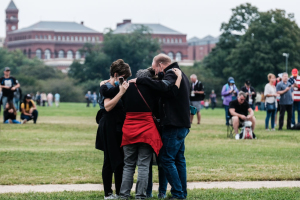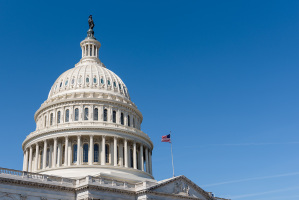A Biblical Response to Religious Persecution

We can no longer say that we, in the United States, are free from religious persecution. Even with laws that should be protecting us, Christians are experiencing increased threats, accusations, and legal actions aimed at silencing our voices. Not only does it affect the public square, but it has reached our own communities and houses of worship. The price tag for our convictions has gone beyond just intimidation and criticism to the actual loss of life as demon-fed violence is now at the church door.
How do believers respond to such threats? What kind of action do we take in such a volatile culture of hatred towards Christianity?
The book of Acts details the experiences of the early disciples as they led the newly birthed church in much the same situation we face today. Even as the Holy Spirit was being poured out in signs, wonders, and miracles, the public authorities, and even the religious leaders of the day, were rising up against this new wave of passionate followers of Christ. The example and testimony of these disciples should serve as a guide for how we can respond to such threats today.
In Acts 4, Peter and John were taken before the city council to answer for their extreme religious views and actions. In response, the Scripture says:
...they raised their voices together in prayer to God. "Sovereign Lord," they said, "You made the heavens and the earth and the sea, and everything in them... consider their threats and enable Your servants to speak Your word with great boldness. Stretch out Your hand to heal and perform signs and wonders through the name of Your holy servant, Jesus" (Acts 4:24, 29-30).
They didn't wring their hands in desperation or call for a demonstration against those who accused them. They went right into worship and asked God to give them even more opportunities to speak His name!
In the next chapter, it tells what the apostles did after they came back from a flogging – not from the godless civic authorities, but from the religious rulers of the day – the Sanhedrin. This was the supreme religious court that should have been supporting their testimony and backing them up. Instead, the apostles were beaten and ordered to stop speaking the name of Jesus.
The apostles left the Sanhedrin, rejoicing because they had been counted worthy of suffering disgrace for the Name. Day after day, in the temple courts and from house to house, they never stopped teaching and proclaiming the good news that Jesus is the Messiah (Acts 5:41-42).
In the face of such threats, the consistent response from the early disciples was to rejoice, pray, and continue preaching the good news.
Before anything else, these passionate followers of Christ came together and worshiped God, acknowledging His rule and reign in every situation. Not only did they rejoice because of the impact of the gospel they were preaching, they asked for even greater boldness to do more! Their prayers were not as much for protection as they were for courage to stand in the face of such intense opposition.
They had an unshakable faith in God's promise and purpose for their lives and were convinced of the power of the kingdom of God to heal the broken culture around them. They had been personally transformed by a first-hand encounter with Christ that radically changed their world-view and empowered their mission. Even death threats would not stop their charge to tell the world about this Savior they knew so well.
Another strategy the early disciples employed against the fierce opposition they faced was to establish a spiritual beach-head in every city. Rather than going to the governmental authorities to incite change, they went directly to the spiritual influencers in the region. Some of these leaders did not even have a title, but because of their heart's posture, they were open to hearing the truth. Aeneas (Acts 9:32-35), Tabitha (Acts 9:36-43, Cornelius (Acts 10:23-48), and Lydia (Acts 16:14-15) were all converted through the testimony of these disciples and then influenced their entire city for the Lord.
This strategy proved highly effective, especially when dealing with witchcraft in the land. The disciples focused their energies on reaching the people, not necessarily defending themselves, taking up causes against the local authorities, or engaging in "spiritual warfare." They knew the only way to defeat the spiritual strongholds over cities and regions, was to displace them with the truth and power of the kingdom of God.
Now for some time a man named Simon had practiced sorcery in the city and amazed all the people of Samaria. He boasted that he was someone great, and all the people, both high and low, gave him their attention ...But when they believed Philip as he proclaimed the good news of the kingdom of God and the name of Jesus Christ, they were baptized, both men and women. Simon himself believed and was baptized (Acts 8:9-10, 12-13).
Even in the face of outright witchcraft and demonic interference, the apostles declared the Word of God and demonstrated the power of the kingdom. The religious persecution they experienced was the result of people being under a veil of deception fed by unregenerate and spiritually blind leaders. Believing in the power of God to utterly save and deliver even the most hardened opponent, the disciples preached the Word of God fearlessly. They trusted in the power of God to validate their message. As a result, even several of the governmental authorities would change their minds (for example, the proconsul in Acts 13:4-12).
Our human tendency, in the face of accusations, threats, and persecution is to fight back. Our godly zeal compels us to act. Though there is certainly a place for lively biblical discourse, healthy debate, and strategizing effective counter-measures for our own safety, we must always start from a kingdom perspective that is victorious. We must remember the power and authority we have been given as believers, not to prove our case, but to prove His. He is more than able to show Himself strong and mighty if we but give Him the opportunity. We can do this best when we respond accordingly by:
- Rejoicing in God's supreme authority and commitment in establishing His kingdom above all others.
- Praying for greater boldness and effectiveness in being carriers of that kingdom to those around us.
- Declaring His truth to displace the lies so that all men may be saved.
Wanda Alger is a Field Correspondent for Intercessors for America. Follow her blog at www.wandaalger.me.




























